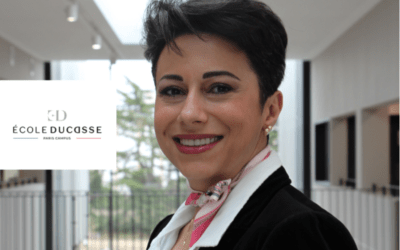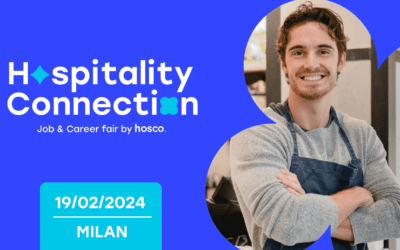Read our exclusive interview with renowned Le Cordon Bleu Chefs, Emil Minev and Éric Briffard, to learn which hard and soft skills will boost your employability as a Chef. They also share the latest culinary trends, the importance of lifelong learning and how COVID-19 has impacted the kitchen.
Get ready to make a Michelin-star impact on your career as a Chef with their insights below!
What is the Top Soft Skill a Chef Should Have?
Chef Minev: A Chef must have a genuine passion for food, be self-motivated and self-disciplined. They must also possess natural curiosity, a willingness to learn and must be an open-minded person.
What is the Top Hard Skill a Chef Should Have?
Chef Briffard: The best hard skill that Chefs today and tomorrow should possess is the foundation of French culinary techniques which has been codified for both cuisine and pastry. These essential technical skills allow you to evolve and create throughout your life like you would with music theory. They are the fundamental foundations of our professions, which we teach in our Le Cordon Bleu Institutes.
Chef Minev: A well-rounded Chef has to have good in-depth knowledge of all aspects of the profession, i.e.:
- Complex cooking skills
- Basic patisserie and bakery skills
- Knife skills such as butchering and fish filleting
All of these are very important for any senior Chef. Since Chefs work in a brigade, they must have good people management skills. To get the best out of their team, a Chef has to be able to understand and manage them well. An understanding of the business’s financial side is also fundamental, regardless of how talented a cook is. If the restaurant struggles to make a profit at the end of the month, then, in reality, it will not last long. Hence, managing the food cost and the labour cost well is vital.
At Le Cordon Bleu Institutes, we cover all these aspects in our programs. Apart from the culinary demonstration and workshops, our students have an opportunity to learn team management, food cost control, and how to run a profitable business in general.
Which of The Latest Trends Would You Prioritise As a Chef?
Chef Briffard: The latest food trends tend to follow human evolution. Today, there is a need to protect our planet’s resources, Mother Earth, which are in danger. This is the real challenge of the 21st century. Chefs are purifying their culinary creations right down to the essentials, as customers are concerned about identification and the traceability of prepared products.
The pastry sector is also aiming to be more virtuous and healthier: lower in sugar, removing additives, colorings, and chemical powders, in favor of heritage flours, and local, fresh, and seasonal products.
Chef Minev: Nutrition, sustainability, and zero food waste are other significant trends and something that we all have to focus on these days. Each of us aspires to eat a healthier diet, with less meat and more plants and cereals, from a responsible and, if possible, locally produced culture.
Plant-based cuisine, for example, has seen a real renaissance in the last five years. In the UK itself, many excellent Chefs run restaurants that serve plant-based food. In January 2020, Le Cordon Bleu successfully launched a new Diploma program -in Plant-based Culinary Arts, something we are very proud of.
Chef Briffard: Our Le Cordon Bleu Institutes propose innovative programs that are constantly being updated and now offers: Nutrition and Food Trends, Plant-Based, Pastry Wellness and Innovation, Asian Cuisine and Advanced Culinary Techniques to meet the requirements of today’s professional world.
→??? You can find courses offered by Le Cordon Bleu here.
How Important is Lifelong Learning For a Chef?
Chef Minev: It is one of the most critical parts of our profession since the world is changing fast, and the Culinary Industry needs to adapt quickly. As Chefs, we must continuously evolve and develop our skills and knowledge. No matter what level of their career a Chef is, there are always new skills to learn and new knowledge to be gained.
Chef Briffard: In that regard, continuous learning and training are essential to understanding this new food codes’ structural evolution. It is the best way to meet consumer expectations and tailor our offer to them. Our urban lifestyle is accelerating with new concepts, such as “cuisine nomade”, click and collect, naturalist cuisine, world cuisine, and sustainable delicacies.
How Has COVID-19 Impacted the Kitchen?
Chef Minev: Despite the overall negative impact the COVID-19 crisis had and still has on the Hospitality Industry, there are also some positive outcomes: Chefs and Restaurateurs became more creative, and many had to come up with an alternative way of running businesses through an innovative approach.
Some restaurants brought the “take away/eat at home” concept to a completely different level. Coming up with new ideas and new offerings was the only way to survive this crisis. This is why the soft skills mentioned above are crucial qualities for a modern-day Chef.
Chef Briffard: Rethinking their business models also allowed Chefs to provide more flexibility to their restaurants or businesses. They looked at reducing operating costs without compromising quality and with increased digitisation of their activity. The changes made included: refocusing on the essentials with greater simplicity, offering the guarantee of a kitchen with impeccable hygiene, environmentally friendly practices and with less waste, and rethinking supply and distribution methods.
Thanks to COVID-19, a new vision of our catering profession has been created. One geared to access as many people as possible by offering healthy, seasonal cuisine on-site or taking away. It is important to have the right tools for training in culinary management at an international level for this reason.
Looking for Chef Jobs?
➡️ Find and apply to local and international Chef jobs here: from Head Chef, Sous Chef, Pastry Chef, and more.

Chef Emil Minev
Culinary Arts Director, Le Cordon Bleu London
Bulgarian-born Chef Emil Minev discovered his culinary passion while working in Bulgaria’s hotel sector. He moved to London in 2001 and joined the 3 Michelin-starred La Tante Claire Restaurant at The Berkeley Hotel. Here, he had his first experience within the pastry kitchen. Intrigued by the artistry, he enrolled at Le Cordon Bleu, where he graduated with a Diplôme de Patisserie in 2002.
Chef Emil then trained at some of London’s best restaurants and continued his education at the Alain Ducasse Formation Centre in Paris and the 3 Michelin-starred El Bulli in Barcelona. He joined The Ritz London as Senior Sous Chef afterwards.
In 2007, he became the Executive Sous Chef at the Jumeirah Emirates Towers Hotel, and in 2010 he joined the Shangri-La Group. His Executive Chef role at The Shard won him many accolades. Chef Emil joined Le Cordon Bleu London as Culinary Arts Director in 2016.

Executive Chef, Culinary Arts Director, and Head of Le Cordon Bleu Paris Institute
Burgundian Chef Briffard began training at the Relais Saint-Fiacre. He then became a compagnon (craftsmen’s guild apprentice) at the Concorde Lafayette Paris hotel, L’Espérance, and the Manoir de Paris. At the age of 28, he became Chef at the Royal Park Hotel’s restaurant in Tokyo.
He started pursuing his own style of cuisine years later and won several Michelin stars. He was crowned one of France’s Best Craftsmen in 1994, 2010’s Chef of the Year, received four chef hats from Gault & Millau and a Grand Prix for his book.
In 2016, he received the Parisian Grand Vermeil medal and awarded Knight of both the Order of Agricultural Merit and the Order of Arts and Letters. In 2018, he received a Knight in the World Order Medal. Éric Briffard has been Executive Chef and Culinary Arts Director at Le Cordon Bleu Paris Institute since 2016 and Head of the Institute since 2018.



